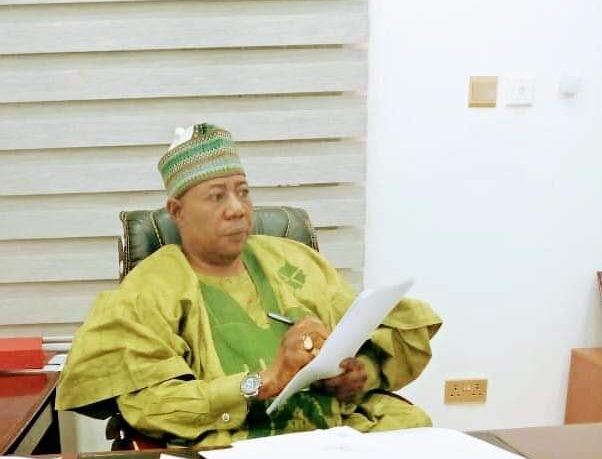There’s a general consensus that the ultimate objective of good governance is to provide general welfare to the people. Hence, it is safe to say the people are both the objects and subject of governance.
It is this direction that the Renewed Hope Agenda set out to evolve a people-centred policies. Despite the tumultuous challenges inherited by the President Bola Ahmed Tinubu-led administration, it has continued to demonstrate capacity and capability.
Some of the many initiatives of this government is the Student Loans Scheme and Consumer CreditScheme. Let me reecho the Nelson Mandela’s famous quote: “Education is the great engine of personal development. It is through education that the daughter of a peasant can become a doctor, that the son of a mine worker can become the head of the mine; that a child of farm workers can become the president of a great nation.”
This is why the scheme is a powerful idea whose time has come. On a yearly basis we watch, helplessly, indigent children drop out of schools because of the inability of their parents to foot their education bills. Such children become frustrated eventually and most of them end up taking to crime as a way of venting or taking their pound of flesh on the system.
Experts have variously alluded the mindless crime been perpetrated by youths to pent up anger. This scheme is a silver lining or life line for the ever aspiring and energetic Nigerian youths. Never again will it be said that a student in Nigeria dropped out of school on account of inability to pay tuition fees.
The Student Loans (Access to Higher Education) Act (Repeal and Re-Enactment) Bill, 2024, was signed into law by President Tinubu on the same day it was passed. This swift accent underscores the importance the president attaches to the future of the Nigerian children. The law was established through an executive bill titled, “A Bill for an Act to Repeal the Students Loans (Access to Higher Education) Act, 2023 and Enact the Student Loans (Access to Higher Education) Bill, 2004 to Establish the Nigerian Education Loan Fund as a Body Corporate to Receive, Manage and Invest Funds to Provide Loans to Nigerians for Higher Education, Vocational Training and Skills Acquisition and for Related matters.”
Suffice also to state that elsewhere, this type of scheme have produced world class leaders in different sectors around the world. Indigent children who ordinarily would have ended up in the street eventually became leaders of the most powerful nations in the world. The example of former President Barack Obama is most striking. Coming from no significant background, Obama and his wife, Michelle were able to realise their God-given vision through Student Loans Scheme. Obama became the leader of the free world, but he didn’t grow up rich. He and his wife Michelle both had to take out loans to fund their educations. Obama rose to become the 44th President of the United States for two terms and his wife, Michelle, US First Lady for eight years.
Also, a US presidential contender, Florida’s Senator Ted Cruz, while on the campaign trail in 2015 at the age of 44, spoke at Liberty University and alluded to his experience of having to finance his education. Cruz said, “I took over $100,000 in school loans, loans I suspect a lot of y’all can relate to, loans that I’ll point out I just paid off a few years ago.” This is the opportunity Tinubu has just thrown at the doorsteps of Indigent Nigerian students.
Needless to emphasise that the Nigerian Student Loan Scheme is a program designed to make higher education more accessible by providing interest-free loans to students. Here are some of the benefits of the scheme:
Increased access to education: By making financing more readily available, the scheme can help students who wouldn’t otherwise be able to afford college to attend.
Reduced financial burden: The loans are interest-free, which can significantly reduce the overall cost of education for students and their families.
Investment in the future: By helping more people get a college education, the scheme can lead to a more skilled and qualified workforce, which can benefit the economy as a whole.
On the other hand, the recently approved take-off of the first phase of the Consumer Credit Scheme is another bold step aimed at making life easy for Nigerians. Consumer credit serves as the lifeblood of modern economies, enabling citizens to enhance their quality of life by accessing goods and services upfront, paying responsibly over time.
The Nigerian Consumer Credit Corporation (CREDICORP) is a new program launched by the Tinubu’s government to help citizens access loans for essential purchases and improve their financial management skills. This initiative aims to boost the economy and provide Nigerians with more opportunities for financial mobility.
I must also commend briefly the renewed synergy between the federal government, state governors and the private sector stakeholders signed earlier this week under the watch of Vice President Kashim Shettima in Aso Rock. The pact termed Aso Accord for Economic and Financial Inclusion is also part of efforts to actualise delivery of financial services at affordable costs to all Nigerians, including those at disadvantaged and low-income segments of society.
The schemes are a welcome development which indicates that the renewed hope administration is a people-oriented government. With the scheme, there is no need to create state police because the Tinubu administration is already policing the people by these poverty eradication programs. An age-long saying goes that an idle mind is the devil’s workshop. And a hungry man is an angry man.” These Renewed Hope Initiatives will take children off the streets and by extension, crimes.
There’s a popular counsel in the Nigerian parlance that, “Follow who know road.” Tinubu has, by these policies, demonstrated the capability to turn things around for Nigeria. Without an iota of a doubt, the Student Loans Scheme and Consumer CreditScheme are brilliant policies that are capable of providing silver lining for Nigerians.
However, my experience from previous such good initiatives calls for caution. There were programs such as Directorate of Food, Roads and Rural Infrastructures. The Military Government of General Ibrahim Babangida in 1986 came with the rural infrastructural development programme and established the directorate of food, roads and rural infrastructure (DFRRI). The programme was to open up the rural areas for effective agricultural activities and boost food production.
In October 1989, Babangida also established the People’s Bank of Nigeria to cater for underprivileged citizens who could not access loans in commercial banks due to lack of collaterals. In 1992 the People’s Bank of Nigeria had 200 branches located throughout the country and made loans to some 245,000 clients during that period.
Similarly, the Economic Advancement Programme (FEAP) was established in 1997 by the Federal Military Government led by the late Gen Sani Abacha. This was formulated to empower Nigerian families for economic self-sufficiency and social integration.
This is not forgetting the National Poverty Eradication Programme (NAPEP). The programme established in 2001 by the Nigerian government led by for President Olusegun Obasanjo was aimed at addressing poverty in Nigeria and related issues.
These programs were all well crafted to pull millions of Nigerians out of poverty. Alas, we achieved the opposite. Instead of poverty reduction, we achieved poverty aggravation, as these programmes became conduit pipes to line the bank accounts of the ruling elites. They became paddy paddy schemes that are used to settle friends and cronnies.
Though President Tinubu, the recruiter-in-chief, has done his usual magic pick with the choice of a renowned banker and businessman, Jim Ovia, as the Chairman, Board of the Nigerian Education Loan Fund (NELFUND), care needs to be taken to ensure those he works with don’t become another clog.
It is said that those who fail to learn from history repeat historical mistakes. The Tinubu administration must understudy the aforementioned programmes and identify what led to their colossal failure. By so doing, we will be able to avoid the pitfalls of the past initiatives.
To put it more succinctly, it is my humble submission that the president should establish a special panel of inquiry on why these previous federal government’s schemes and programmes targeted at improving the lives of Nigerians failed, who frustrated them and where the public funds earmarked for them were syphoned to in order to avoid future occurrence.
May God guide our president as he continues with his good work of changing the fortunes of our great nation for good.




